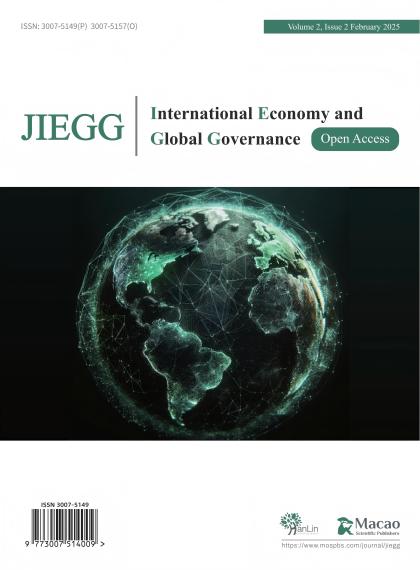-
Wang, F. (2019). Mercado Común del Sur. Social Sciences Academic Press: 1.
-
Zong, H. W. and Xie, Z. P. (2022) China’s International Role in UN Agencies: A Perspective of Self-Others. The Journal of International Studies, (6): 52-75.
-
Holsti, K. J. (1970). National Role Conceptions in the Study of Foreign Policy. International Studies Quarterly, 14(3): 244-246.
-
Stephen Walker, G. (1987). Role Theory and Foreign Policy Analysis. Duke University Press: 66-79, 81-93.
-
Thies, C. G. and Breuning, M. (2012). Integrating Foreign Policy Analysis and International Relations Through Role Theory. Foreign Policy Analysis, 8(1): 1-4.
-
Naomi Bailin, W. (1980). Foreign Policy Makers and Their National Role Conceptions. International Studies Quarterly, 24(4): 532-554.
-
Stephen, G. W. (1987). Role Theory and Foreign Policy Analysis. Duke University Press: 241.
-
Hedley, B. (1977). The Anarchical Society: A Study of Order in World Politics. Macmillan: 9-10.
-
Xu, B. and Willian, M. R. (2019). Decision of Russia’s Energy Diplomacy Toward China in the Perspective of Role Theory in International Relations. Northeast Asia Forum, (4): 98-111.
-
Pang, X. (2006). The Definition and Change of International Roles: The Establishment of a Dynamic Analytical Framework. The Journal of International Studies, (1): 133-143.
-
Bengtsson, R. and Ole, E. (2011). Reconsidering the European Union’s Roles in International Relations: Self-conceptions, Expectations, and Performance. Role Theory in International Relations: 113-130.
-
Argentina Llega a 142.7% de Inflación a las Puertas del Balotaje Presidencial. 2023-11-13, https://expansion.mx/economia/2023/11/13/argentina-llega-a-142-7-de-inflacion-a-las-puertas-del-balotaje-presidencial.
-
Lorenzini, M. E. and Pereyra Doval, M. G. (2023). Cuarenta Años de Política Exterior en Democracia: la Integración Regional Como Política de Estado. Temas & Debates: 113-123.
-
Casullo, M. E. (2022). El Curioso Caso de un Peronismo no Verticalista. Nueva Sociedad, (3-4): 299.
-
Natanson, J. (2021). Las Batallas de Alberto Fernández. Nueva Sociedad, (3-4): 4.
-
Naciones Unidas en Argentina. (2022). Análisis de País: 9.
-
Padinger, G. Así Han Sido los 4 Años del Gobierno de Alberto Fernández Como Presidente de Argentina. 2023-12-07, https://cnnespanol.cnn.com/2023/12/07/analisis-gobierno-alberto-fernandez-presidente-argentina-orix/.
-
María, C. M. (2023). De Macri a Fernández: Dilemas de la Política Internacional Argentina. Revista Sudamerica, (13): 80-110.
-
Felipe Solá Reafirmó la Voluntad de Integración del MERCOSUR. 2021-03-12, https://www.cancilleria.gob.ar/es/actualidad/noticias/felipe-sola-reafirmo-la-voluntad-de-integracion-del-MERCOSUR.
-
Simonoff, A. La Cuestión Malvinas en la Política Exterior de Mauricio Macri y de Alberto Fernández. 2022-06-1, https://vocesenelfenix.economicas.uba.ar/la-cuestion-malvinas-en-la-politica-exterior-de-mauricio-macri-y-de-alberto-fernandez/.
-
Zelicovich, J. (2023). Una Política Exterior para la Jungla. Nueva Sociedad, (11-12): 199-214.
-
Severo, L. W. Las Cuatro Etapas del MERCOSUR entre 1991 y 2021. 2021, https://revistaallaite.unla.edu.ar/95/las-cuatro-etapas-del-MERCOSUR-entre-1991-y-2021.
-
Barros, P. S. La Agenda Uruguaya para Flexibilizar el MERCOSUR. 2021-03-03, https://www.elobservador.com.uy/nota/la-agenda-uruguaya-para-flexibilizar-el-MERCOSUR-202133142910.
-
Marí, E. Argentina ante la Encrucijada de Bajar los Aranceles del MERCOSUR. 2021-05-02, https://www.ambito.com/opiniones/MERCOSUR/argentina-la-encrucijada-bajar-los-aranceles-del-n5188781.
-
Borges, R. and Federico, R. M. Brasil y Argentina Liman Diferencias y Acuerdan Reducir 10% el Arancel Externo Común de MERCOSUR. 2021-10-08, https://elpais.com/economia/2021-10-09/brasil-y-argentina-liman-diferencias-y-acuerdan-reducir-10-el-arancel-externo-comun-de-MERCOSUR.htm.
-
Yue, Y. X. The IMF’s $57 Billion Failed to Cure Argentina. Was it Because the “South American Eagle” Failed to Live Up to Expectations or Because the Wrong Medicine Was Prescribed? 2019-08-22, https://www.yicai.com/news/100304338.html.
-
Della Vecchia, N. Viento de Frente: Cómo Impactará en Argentina la Suba de Tasas en Estados Unidos. 2022-01.25, https://www.forbesargentina.com/money/viento-frente-como-impactara-argentina-suba-tasas-estados-unidos-n12134.
-
Qué Tanto Subirán las Tasas de Interés en EE. UU.? Analistas Responden. 2022-12-12, https://www.elespectador.com/economia/macroeconomia/que-tanto-subiran-las-tasas-de-interes-en-ee-uu-analistas-responden/.
-
Comisión Económica para América Latina y el Caribe. (2022). Repercusiones en América Latina y el Caribe de la guerra en Ucrania: ¿cómo enfrentar esta nueva crisis?: 16.
-
Zhang, J. Y. Amid the Russia-Ukraine Conflict, Latin America Faces a Difficult Choice between the United States and Russia. 2022-03-29, https://www.ciis.org.cn/yjcg/sspl/202204/t20220401_8492.html.

